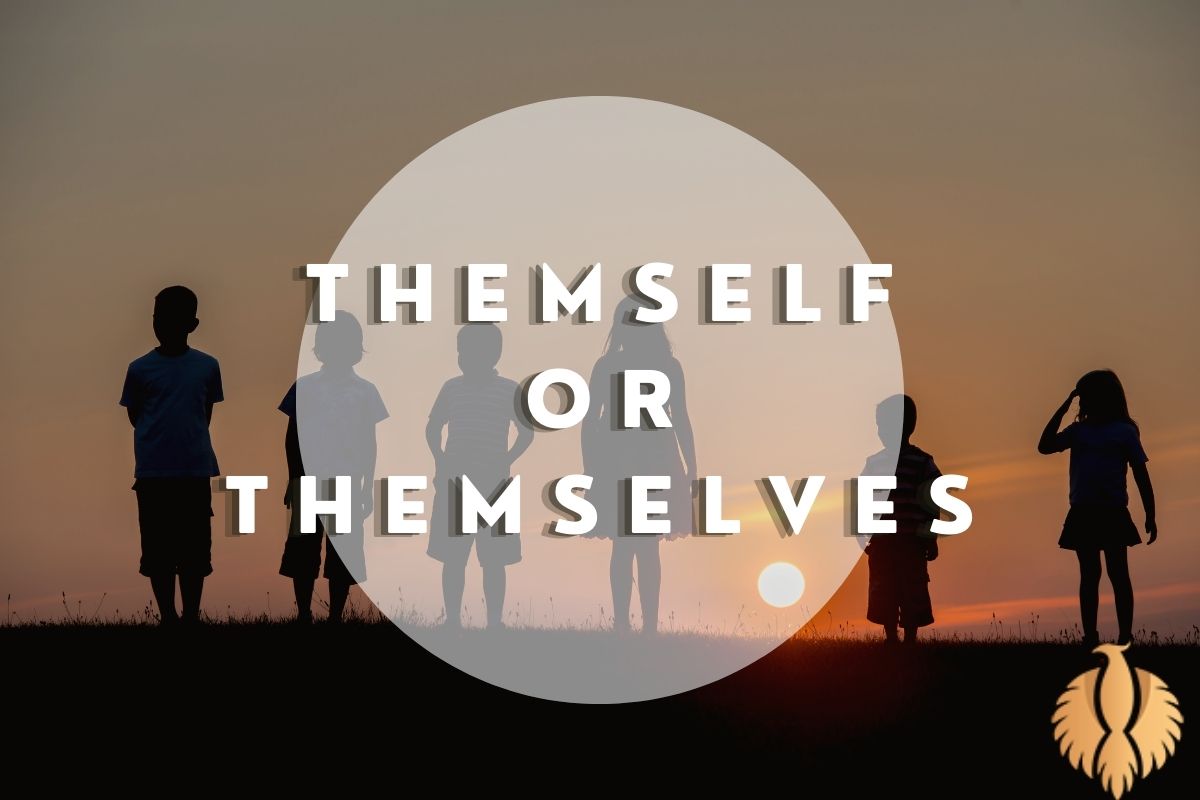In most of my classrooms, when it comes to using the pronoun “themself” or “themselves,” there is often confusion among students about which one is the correct form to use.
In this article, I’m going to explain about these two so that they won’t be confused anymore.
So let’s see “themself or themselves”: “Themselves” is the traditionally correct reflexive pronoun for referring to a group or a singular individual in a gender-neutral manner, widely accepted in both formal and informal contexts. On the other hand, “themself” is emerging as a gender-neutral option, especially within non-binary and genderqueer communities, reflecting personal identity and preference.
While “themselves” remains the standard in formal English, “themself” is gaining acceptance as language evolves to embrace inclusivity.
Both forms are used to refer to a single individual or entity, but “themself” is considered non-standard English. The more commonly accepted form is “themselves.”
The confusion arises because “themselves” is typically used to refer to a group of people or things, while “themself” is used to refer to an individual.
However, in contemporary English, “themselves” is also used to refer to a singular individual when the gender is unknown or when a person prefers gender-neutral language.
In traditional grammar, “themselves” is considered a reflexive pronoun used to reflect back to the subject of the sentence.
For example, “They bought themselves a new car” or “The student prepared themselves for the exam.”
In both of these sentences, “themselves” is used to refer to a group of people or a singular individual in a gender-neutral manner.
On the other hand, “themself” is considered a non-standard or informal form of “themselves.” It is often used in informal speech or writing, and it is not widely accepted in formal or academic contexts.
However, “themself” is gaining more acceptance as a gender-neutral pronoun, particularly in non-binary and genderqueer communities.
The use of “themself” reflects a growing awareness of the need for inclusive language that respects and acknowledges individuals who do not identify within the traditional gender binary.
By using “themself,” individuals can assert their identity and be addressed in a way that aligns with their gender identity.
Therefore, the choice between “themself” and “themselves” ultimately comes down to personal preference and the context in which the language is being used.
You might also enjoy: Beside The Point Or Besides The Point: Exploring the Difference [2024]
Differences between “themself” and “themselves” in Terms of Usage
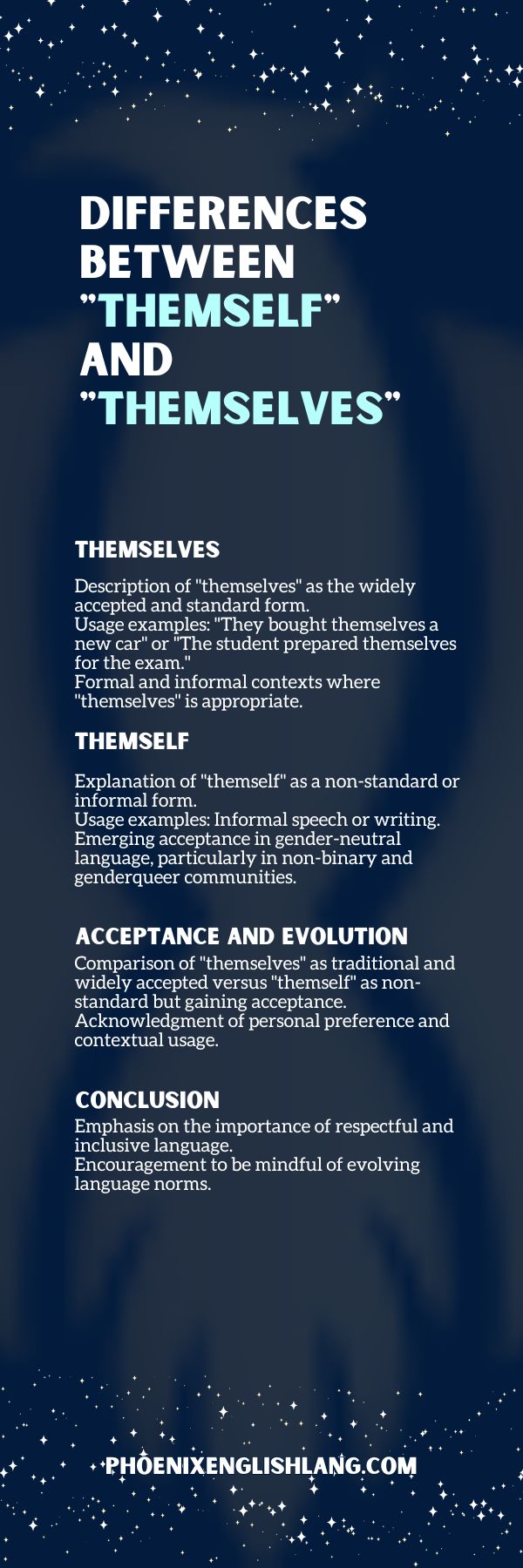
The differences between “themself” and “themselves” in terms of usage primarily lie in their acceptance and formality in the English language.
“Themselves” is the more widely accepted and standard form of the reflexive pronoun used to refer to a group of people or a singular individual in a gender-neutral manner.
It is used in both formal and informal contexts and is generally considered the correct form in standard English.
For example, “They bought themselves a new car” or “The student prepared themselves for the exam.”
On the other hand, “themself” is considered a non-standard or informal form of “themselves.” It is often used in informal speech or writing and is not widely accepted in formal or academic contexts.
However, “themself” is gaining more acceptance as a gender-neutral pronoun, particularly in non-binary and genderqueer communities.
It is used to refer to a singular individual in a gender-neutral way, especially when the gender is unknown or when an individual prefers gender-neutral language.
“Themselves ” is the more traditional and widely accepted form of the reflexive pronoun, while “themself” is considered non-standard English but is increasingly being embraced as a gender-neutral pronoun.
The choice between the two forms ultimately depends on personal preference and the context in which the language is being used.
As language continues to evolve, it is important to be mindful of the diverse ways in which individuals may identify and to use language that is respectful and inclusive.
You might also enjoy: She And I Or Her And I: My 2024 Method In Teaching This
Contexts in which “themselves” is Considered the Correct form in Standard English

“Themselves” is considered the correct form in standard English when it is used as a reflexive pronoun to refer to a group of people or a singular individual in a gender-neutral manner.
It is used in both formal and informal contexts and is widely accepted in the English language. Here are some common contexts in which “themselves” is considered the correct form:
1. Reflexive Pronoun
“Themselves” is used as a reflexive pronoun to reflect back to the subject of the sentence. For example, “They bought themselves a new car” or “The student prepared themselves for the exam.”
2. Gender-Neutral Language
“Themselves” is used to refer to a singular individual in a gender-neutral manner, especially when the gender is unknown or when an individual prefers gender-neutral language. For example, “Each student must choose for themselves whether to participate.”
3. Plural Form
“Themselves” is used to refer to a group of people or things in a gender-neutral way. For example, “The team members congratulated themselves on their victory.”
4. Formal and Informal Writing
“Themselves” is used in both formal and informal writing, making it suitable for a wide range of contexts, including academic, professional, and everyday communication.
In these contexts, “themselves” is considered the correct and widely accepted form in standard English.
It is important to use “themselves” when referring to a group of people or a singular individual in a gender-neutral manner to ensure clear and inclusive language.
You might also enjoy: Has Ran or Has Run: My 2024 + Examples
Reflexive Pronouns

Reflexive pronouns play a crucial role in language, serving as essential tools for expressing actions that reflect back onto the subject.
These pronouns include “myself,” “yourself,” “himself,” “herself,” “itself,” “ourselves,” “yourselves,” and “themselves.”
One primary function of reflexive pronouns is to indicate that the subject and the object of the verb are the same entity.
This self-reflection adds depth and precision to language, allowing for nuanced expressions. For instance, in the sentence “I taught myself to play the guitar,” the reflexive pronoun “myself” emphasizes the self-directed nature of the learning process.
Reflexive pronouns also contribute to the clarity and coherence of sentences. Without them, the intended meaning might be ambiguous.
Consider the sentence “She sees herself in the mirror.” Here, the reflexive pronoun eliminates any confusion about whom the subject is seeing.
Moreover, reflexive pronouns are integral in constructing sentences where the subject performs an action on itself.
This self-contained action is exemplified in sentences such as “The cat groomed itself” or “We disciplined ourselves to meet the deadline.” In these instances, the reflexive pronoun encapsulates the idea of internal action.
It is noteworthy that reflexive pronouns are not exclusive to individuals; they are equally applicable to collective entities.
In the sentence “The team congratulated itself on the victory,” the reflexive pronoun “itself” conveys the idea that the team, as a unified whole, is the subject and object of the congratulatory action.
In addition to their grammatical functions, reflexive pronouns contribute to the nuances of communication.
They can convey a sense of self-reliance, responsibility, or introspection. For instance, saying “I solved the problem by myself” emphasizes independence, while “They blamed themselves for the mistake” indicates recognition of personal accountability.
Reflexive pronouns are indispensable linguistic elements that enhance the precision, clarity, and expressiveness of language.
By reflecting actions back onto the subject, these pronouns provide a nuanced way of conveying self-directed actions, contributing to effective communication in both individual and collective contexts.
You might also enjoy: Cancelled or Canceled; Spelling; Examples [2025]
Difference between Reflexive Pronouns and Emphatic Pronouns
Reflexive pronouns and emphatic pronouns share a similarity in form but serve different grammatical functions.
Reflexive pronouns are used when the subject and the object of a verb are the same, reflecting the action back onto the subject. Examples include “myself,” “yourself,” “himself,” “herself,” “itself,” “ourselves,” “yourselves,” and “themselves.”
Emphatic pronouns, on the other hand, are used to emphasise a noun or pronoun in a sentence. They are not essential to the sentence’s structure and can be removed without altering the basic meaning. Emphatic pronouns include “myself,” “yourself,” “himself,” “herself,” “itself,” “ourselves,” “yourselves,” and “themselves” as well.
The key difference lies in their purpose: reflexive pronouns reflect the action back onto the subject, while emphatic pronouns emphasize or intensify a specific noun or pronoun in a sentence. For example:
– Reflexive Pronoun: I saw myself in the mirror.
(Here, “myself” reflects the action of seeing back onto the subject “I.”)
– Emphatic Pronoun: I will do it myself.
(In this case, “myself” emphasizes that the speaker will personally perform the action.)
You might also enjoy: To Bad Or Too Bad ; Correct Grammar + Examples [2024]
Examples of Reflexive Pronouns
Here are some examples of sentences using reflexive pronouns:
- I treated myself to a spa day after a stressful week.
- She taught herself how to code by watching online tutorials.
- The cat groomed itself meticulously, ensuring its fur was immaculate.
- We congratulated ourselves on completing the challenging project ahead of schedule.
- He blamed himself for the misunderstanding and apologized sincerely.
- They found themselves lost in the enchanting beauty of the ancient ruins.
- After the concert, the musicians congratulated themselves on a flawless performance.
- The team pushed itself to the limits to achieve victory in the championship.
- The toddler insisted on feeding herself, showcasing newfound independence.
- In the quiet room, I heard myself whispering affirmations for motivation.
Examples of Emphatic Pronouns
Here are examples of sentences using emphatic pronouns to emphasize or intensify specific nouns or pronouns:
- **I myself** will take care of the situation.
- She completed the entire project **herself**.
- We baked the cake **ourselves**.
- He wanted to explain the concept **himself**.
- You should check the details **yourself**.
- The president addressed the nation **himself**.
- They organized the event **themselves**.
- Jane painted the artwork **herself**.
- The cat opened the door **itself**.
- We booked the tickets **ourselves**.
You might also enjoy: Paid Vs Payed : Differences + Examples [My 2024 Teaching Way]
An Example of When “Themselves” is Used as a Reflexive Pronoun
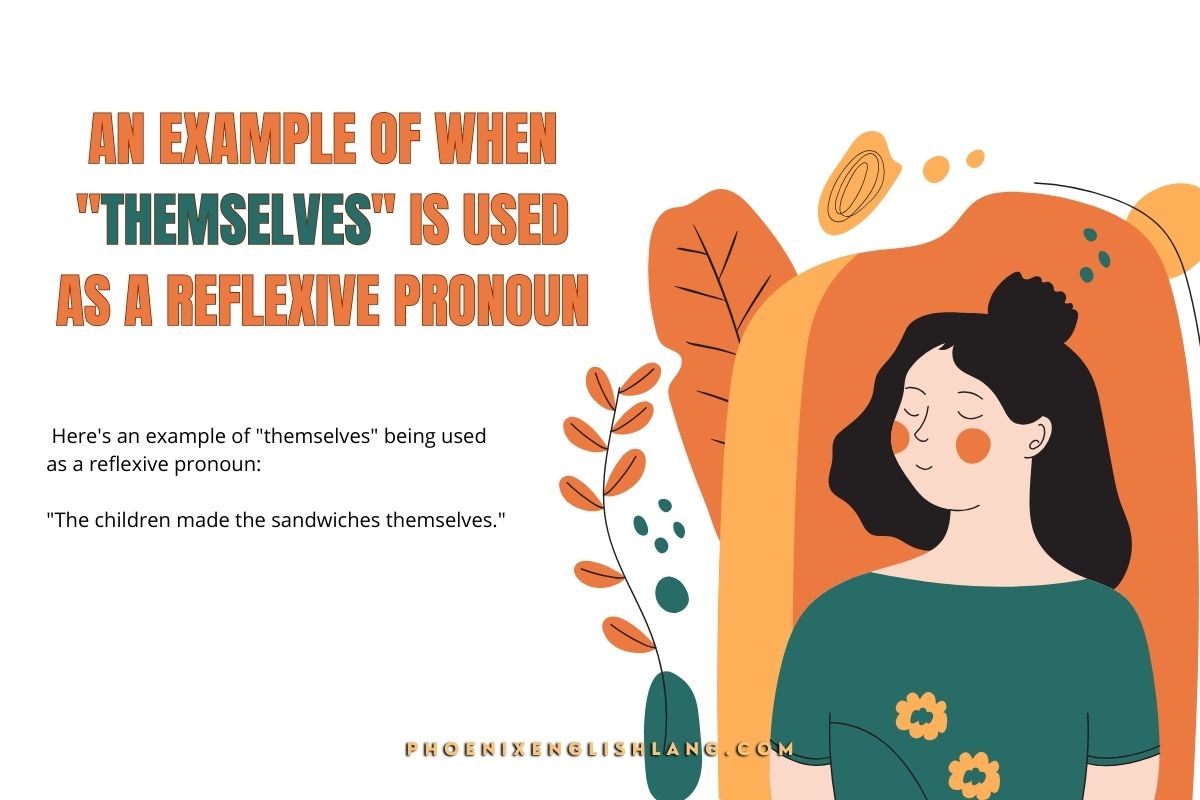
Here’s an example of “themselves” being used as a reflexive pronoun:
“The children made the sandwiches themselves.”
In this sentence, “themselves” is used to reflect back to the subject “the children.” It indicates that the children made the sandwiches without any external help or assistance.
This usage demonstrates the reflexive nature of the pronoun “themselves” in the context of the action being performed by the same subject to whom it refers.
How else can “themselves” be used as a reflexive pronoun?
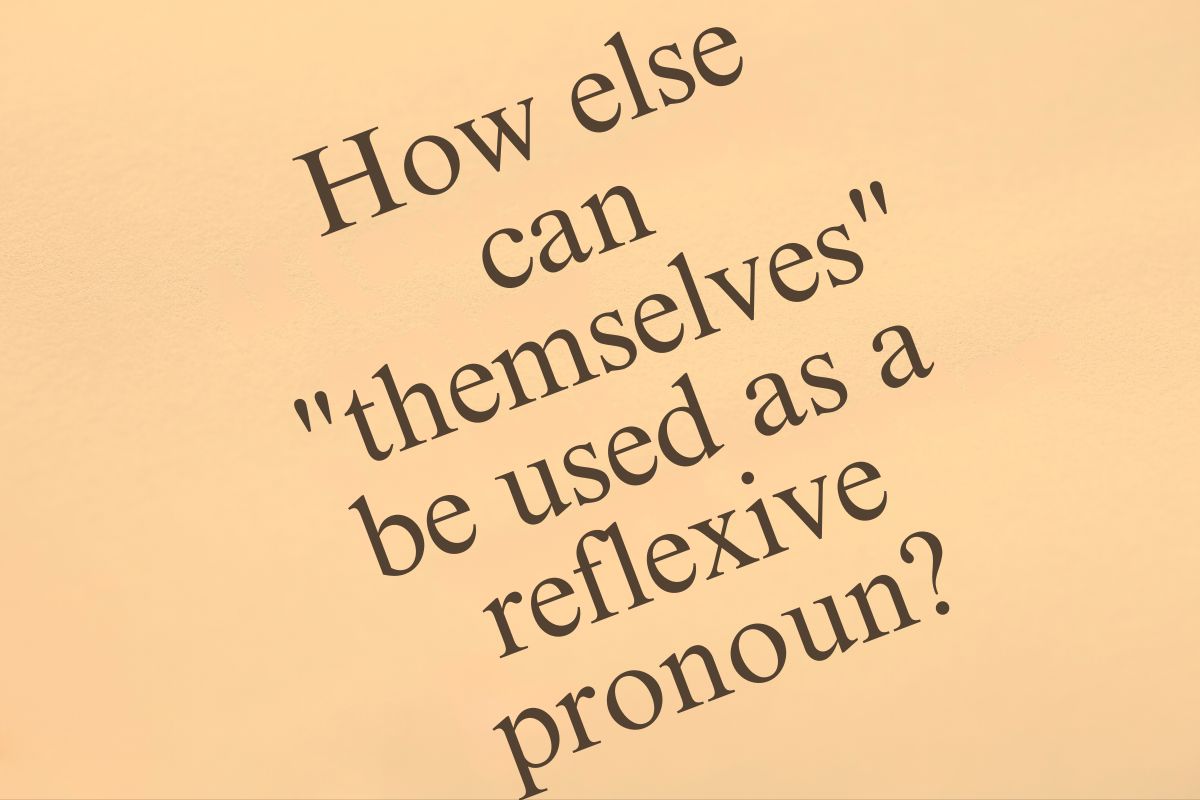
“Themselves” can be used as a reflexive pronoun in various contexts to reflect back to the subject of the sentence. Here are some additional examples of how “themselves” can be used as a reflexive pronoun:
“The students organised the event themselves.”
In this sentence, “themselves” reflects back to the subject “the students,” indicating that the students organized the event without external help.
“The employees are responsible for cleaning up after themselves.”
Here, “themselves” reflects back to the subject “the employees,” indicating that the employees are responsible for cleaning up their own mess or belongings.
“The team members congratulated themselves on their performance.”
In this example, “themselves” reflects back to the subject “the team members,” indicating that the team members congratulated each other without external involvement.
“The traveler found themselves lost in the unfamiliar city.”
Here, “themselves” reflects back to the subject “the travelers,” showing that the travelers found themselves in a state of being lost without outside influence.
In each of these examples, “themselves” is used as a reflexive pronoun to reflect back to the subject of the sentence, indicating that the action or state described pertains to the same subject.
You might also enjoy: Openned Or Opened: Spelling + Examples [2024]
Examples with Themself
- John and Mary always enjoy spending time by themself.
- The children were left to entertain themself while their parents were away.
- Sarah often finds solace in being by themself.
- The dog was happily playing with themself in the backyard.
- The artist lost themself in their work.
- The introvert prefers to recharge by themself.
- The student were proud of themself for taking the exam.
- The hiker enjoyed the serenity of nature by themself.
- The writer immersed themself in their imagination.
- The athlete pushed themself to the limit during training.
- The actor prepared for the role by studying the character themself.
- The teacher encouraged the students to think for themself.
- The detective relied on themself to solve the mystery.
- The musician lost themself in the music they were playing.
- The chef challenged themself by creating a new recipe.
- The entrepreneur built their business from scratch by themself.
- The traveler enjoyed exploring new places by themself.
- The therapist helped the client discover their true self.
- The scientist conducted the experiment by themself.
- The mentor encouraged their mentee to believe in themself.
- The photographer captured the beauty of nature by themself.
- The dancer expressed themself through their movements.
- The caregiver dedicated themself to taking care of others.
- The leader inspired their team to believe in themself.
- The survivor overcame adversity by relying on themself.
- The activist fought for justice and equality for themself and others.
- The volunteer dedicated their time to helping those less fortunate than themself.
- The artist’s work reflected their innermost thoughts and feelings about themself.
- The philosopher pondered the meaning of life and the self.
- The individual embraced their uniqueness and learned to love themself.
Examples with Themselves
- The siblings enjoyed playing together by themselves.
- The couple decided to spend the weekend by themselves.
- The students organized a study group to help themselves prepare for the exam.
- The employees motivated themselves to meet the deadline.
- The friends often went on adventures by themselves.
- The musicians practiced by themselves to perfect their skills.
- The athletes pushed themselves to achieve their personal best.
- The parents taught their children to be independent and solve problems themselves.
- The team members collaborated and challenged themselves to come up with innovative ideas.
- The actors rehearsed their lines by themselves before the play.
- The individuals embraced self-care and took time to pamper themselves.
- The travelers explored new cities and cultures by themselves.
- The entrepreneurs took risks and started their businesses by themselves.
- The artists expressed themselves through their unique artwork.
- The writers poured their emotions onto paper and expressed themselves through their stories.
- The activists organized protests and fought for justice for themselves and others.
- The chefs experimented with recipes and delighted themselves with new culinary creations.
- The teachers encouraged their students to think for themselves and develop their own opinions.
- The scientists conducted experiments and made groundbreaking discoveries by themselves.
- The volunteers dedicated their time and effort to help those less fortunate than themselves.
- The leaders inspired their followers to believe in themselves and their capabilities.
- The survivors of a natural disaster supported and comforted themselves through the tough times.
- The caregivers took care of their loved ones and put their needs before themselves.
- The philosophers contemplated the nature of existence and the meaning of life itself.
- The adventurers challenged themselves to conquer new heights and push their limits.
- The therapists guided their clients to discover themselves and find inner peace.
- The photographers captured moments and expressed themselves through their lens.
- The spiritual seekers embarked on a journey to connect with themselves and find enlightenment.
- The mentors empowered their mentees to believe in themselves and achieve their goals.
- The individuals embraced self-reflection and worked on improving themselves.
Can you use themselves as singular?
Yes, the pronoun themselves can indeed be used as a singular pronoun. This usage is particularly relevant in contexts where we want to be gender-neutral or inclusive. For instance, when referring to a non-binary individual who does not identify strictly as male or female, using themselves is a respectful way to acknowledge their identity. The use of themselves in a singular form reflects a larger movement towards inclusive language. Historically, English has relied on gendered pronouns like he and she to identify individuals.
Yet, as our comprehension of gender has progressed, so has our vocabulary. Increasingly, people are acknowledging that gender exists beyond a simple binary, and not everyone can be categorized strictly as male or female. Consequently, there is a rising acceptance of they/them as singular pronouns. For instance, if I say, Alex got themselves a coffee, I’m using themselves to refer to Alex without making any assumptions about their gender.
This choice is not only grammatically sound but also promotes respect and inclusivity. Using themselves as a singular pronoun is particularly useful when the person’s gender is unknown or not important. If I come across a lost item and wish to return it, I could say, It looks like someone forgot their phone here. I really hope they return for it. In this case, they and themselves point to an unidentified person, making the statement inclusive and open-ended.
It’s important to recognize that while the singular they/them/themselves is increasingly accepted, it can still spark debate among those who prefer traditional grammar. Nevertheless, language is always changing, and the use of singular they signifies a move towards more inclusive and respectful ways of communicating.
Using themselves as a singular pronoun not only promotes inclusivity but also makes language simpler. Rather than deciding between himself or herself, I can opt for themselves to encompass everyone. This approach is especially beneficial in both writing and speaking, where being clear and straightforward matters.
Where do we use themselves in a sentence?
“We use ‘themselves’ in a sentence when referring to a group of people performing an action on or for themselves. For example, ‘They cooked dinner for themselves.'”
Can I use themselves with everyone?
Yes, you can use “themselves” with “everyone” in a sentence. For instance, “Everyone prepared themselves for the upcoming challenge.”
Why do people call themselves they?

Some individuals identify as non-binary or genderqueer and prefer to use they as their pronoun instead of traditional gender-specific pronouns like he or she. This choice is deeply personal and reflects their understanding of their own gender identity, which does not fit within the conventional binary framework of male and female. Using they as a pronoun allows these individuals to express their gender in a way that feels authentic and true to themselves.
For many, traditional pronouns do not adequately capture their experience of gender, which can be fluid, non-binary, or outside the male-female dichotomy altogether. By choosing they, they can communicate their identity more accurately and comfortably.
Acknowledging and using individuals preferred pronouns is an important way to recognize and support their gender identity. It demonstrates our understanding and validation of their experiences, which is essential for their mental and emotional health.
By using the correct pronouns, I contribute to creating a welcoming and inclusive atmosphere. The singular use of they isn’t a recent development. In fact, they has long been employed in English to refer to someone whose gender is either unknown or not specified. For instance, when I say, Someone left their umbrella here, I’m using they in a singular context.
This practice has been a part of the English language for many years and is completely grammatically acceptable. In recent years, the adoption of they as a pronoun for non-binary individuals has gained more visibility and acceptance.
This shift reflects a broader cultural movement towards recognizing and respecting diverse gender identities. As society becomes more aware of the complexities of gender, language evolves to accommodate and reflect these changes. Using they as a pronoun can also help avoid making assumptions about someone’s gender based on their appearance or name.
It promotes a more inclusive approach to communication, where everyone is addressed in a way that respects their identity. This practice can be particularly important in professional and social settings, where inclusivity and respect are paramount. For non-binary individuals, being referred to by their correct pronouns can significantly impact their sense of belonging and acceptance.
It can reduce feelings of dysphoria and help them feel seen and respected. Conversely, using incorrect pronouns can be hurtful and invalidating, reinforcing feelings of exclusion and misunderstanding.
Can you say in and of themselves?
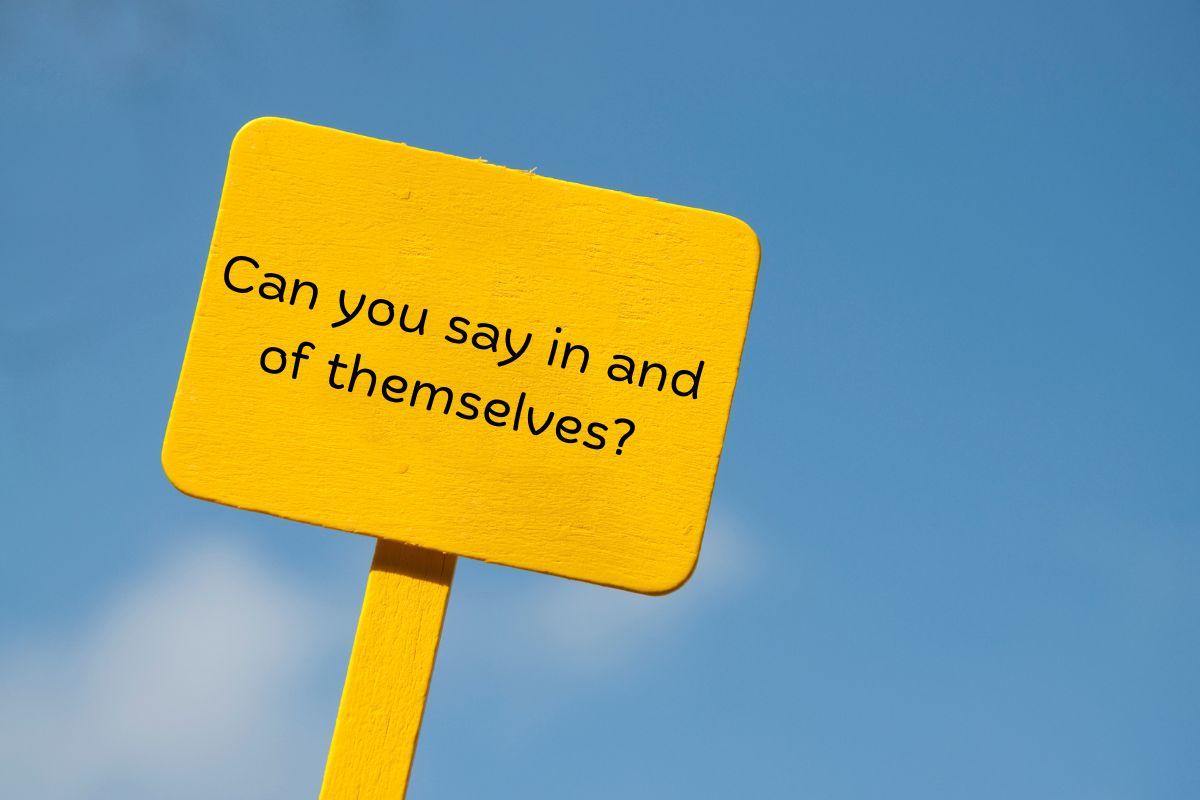
Certainly! “In and of themselves” is a phrase used to emphasize that something has intrinsic qualities or significance, independent of external factors. For example, “The results, in and of themselves, were impressive.”
What can I use instead of themselves?
Instead of “themselves,” you can use alternatives like “thems,” “they,” or rephrase the sentence to avoid using a reflexive pronoun. For example, instead of “They cooked dinner for themselves,” you could say “They cooked dinner for each other.”
Can themselves be used for two people?
Yes, “themselves” can be used for two or more people when they are collectively performing an action on or for themselves. For instance, “They congratulated themselves on their achievement.”
Why use themselves?
Using “themselves” is appropriate when referring to a group of people performing an action on or for themselves, or when respecting the preferred pronouns of individuals who identify as non-binary or genderqueer. It’s a way to be inclusive and considerate of diverse gender identities and expressions.
What is the word for when someone is by themselves?
The word for when someone is by themselves is “solitude” or “alone.”
Can you say they themselves?
Yes, “they themselves” is a grammatically correct phrase that can be used to refer to a singular person in a gender-neutral or non-binary context. It is a way to emphasize that the individual is taking action or speaking for themselves.
What is a person who keeps to themselves?
A person who keeps to themselves is often referred to as an introvert. Introverts are individuals who prefer solitary activities and tend to be more reserved or private in social situations. They may enjoy spending time alone or in small, intimate settings rather than large social gatherings. Introverts often find solitude to be energizing and may need time alone to recharge.
What is the word for talking to themselves?
The term for talking to oneself is “soliloquy” or “self-talk.”
Is there a word called themself?
Yes, “themself” is a gender-neutral pronoun used when someone identifies outside the traditional binary pronouns. It’s an alternative to “himself” or “herself.”
When was the word themself first used?
The use of “themself” as a gender-neutral pronoun has gained prominence in recent years, but its exact origin is challenging to pinpoint. It has likely evolved over time as part of the ongoing efforts to develop inclusive language.
What is the origin of the word themself?
The term “themself” can be seen as a linguistic development to address the need for a gender-neutral singular pronoun. Its usage emerges from a desire for inclusivity and has evolved over time, with no specific single origin or moment of introduction. It reflects ongoing efforts to find language that accommodates diverse gender identities and expressions.
How do you use themself in a sentence?
The reflexive pronoun “themself” is used to refer to a singular person in a gender-neutral or non-binary context. Here is an example sentence using “themself”:
“After a long day at work, Alex likes to spend some time by themself to relax and unwind.”
In this sentence, “themself” is used to indicate that Alex prefers to be alone and unwind on their own.
What does it mean when someone calls themself?
If someone refers to themselves using “themself,” it typically indicates their preference for a gender-neutral pronoun. This may be a choice by individuals who don’t identify strictly with “himself” or “herself” and instead opt for a pronoun that is more inclusive of various gender identities.
Which pronoun is themselves?
“Themselves” is a pronoun used in the third person, typically in the plural form. However, it can also be used as a singular gender-neutral pronoun when someone prefers not to use “himself” or “herself.” In this case, “themselves” serves as a gender-inclusive singular pronoun.
Is themselves a possessive pronoun?
No, “themselves” is not a possessive pronoun. It is a reflexive or intensive pronoun, commonly used to reflect back to the subject of a sentence or to emphasize a noun. The possessive form associated with “they” is “their” (e.g., their book, their idea).

Hi, welcome to my blog! My name is Omid and I am thrilled to have you here! I am an English language teacher with 12 years of experience and hold multiple international certifications (TESOL, IELTS, TOEFL, PTE, CELTA). Additionally, I hold a PhD in Applied Linguistics with a specialization in Teaching English as a Second Language (TESL), which fuels my passion for teaching English and assisting others in mastering the language. To me, nothing is more rewarding than helping individuals enhance their English language abilities through various methods. So, let’s embark on this journey of learning English together.

